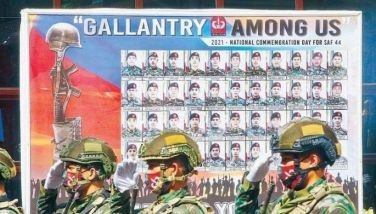Philippines, US agree on language in troops deal
MANILA, Philippines — Both panels of negotiators on the increased rotational presence of American troops have made a consensus on a "mutually agreeable language" upon the conclusion of the sixth round of talks on Sunday.
Defense Undersecretary Pio Lorenzo Batino, also chair of the Philippine negotiating panel, said that both parties have made "significant progress" on several critical provisions of the proposed framework agreement.
"This fresh round has clearly shown the shared commitment of both parties to enhance cooperation in defense, security and related fields, including humanitarian assistance and disaster response," Batino said in a state news report.
"The further exchanges of views have helped pave the way for the formulation of mutually agreeable language," he added.
DND spokesperson Peter Paul Galvez further explained that the preamble, purpose and scope, definition of terms and ownership of constructed infrastructure were agreed on by the representatives of the Untied States and the Philippines.
Included in the draft deal's provisions that the negotiators have reached consensus are on the coordination on security, contracting procedures and resolution of disputes.
The minutes of the meeting described the recent discussions as "substantive and productive."
Batino, meanwhile, had assured the public that the Philippine negotiating panel is guided by principles of full respect for Philippine sovereignty and adamant against nuclear weapons.
The Philippine side had presented a full draft text asserting the country's positions last January upon the resumption of the negotiations following an apparent "impasse" in November 2013.
Defense Secretary Voltaire Gazmin said that the draft document is consistent with the Constitution and informed by experiences from history.
Other members of the Philippine negotiating panel are Ambassador Lourdes Yparraguirre, Ambassador J. Eduardo Malaya, Justice Department undersecretary Francisco Baraan III and DND assistant secretary for strategic assessments Raymund Jose Quilop.
- Latest
- Trending






























